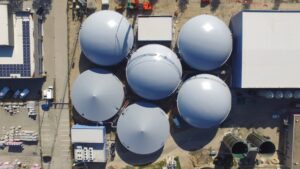HoST and Five Bioenergy to deliver “five of Spain’s largest biogas facilities”

The sites will be located in the Castilla Leon, Aragon, and Murcia regions, and the facilities will include biogas upgrading systems for close to 0.8 TWh biomethane production and CO2 liquefaction plants to recover and liquefy the CO2 from the anaerobic digestion process.
Two of the projects – Milagros and Lorca – have already entered construction.
The project scope for Milagros features three primary digesters and two after-digesters; while in Lorca the project features six primary digesters and three after-digesters. All digesters are 40 metres in diameter and 8 metres high.
The complete technology package will be delivered by HoSt. This means it will provide feeding systems, mixers, roofs, sensors, control system, local pipe and cable works, and heat exchangers.
The provision of heat exchangers ensures a stable temperature in the digesters during different weather and climate patterns within Spain, said the company.
To maximise renewable energy production, both projects include biogas upgrading and CO₂ liquefaction technology. These systems are provided by Bright Renewables.
Together, the biogas upgrading systems will yield 29 million Nm3 of biomethane and the CO₂ liquefaction systems will produce over 40,000 tonnes KG of liquid bio-CO₂ annually. The produced bio-CO₂ will be of food-grade quality.
Combined, the two biogas plants will process annually up to 387,000 tons of agricultural residues including cow, sheep, and poultry manure, alongside expired food such as slaughterhouse waste and distillery waste.
The feedstock is supplied by local farmers who get value for their waste as the digestate, the digested matter, from the biogas plant is converted into biofertiliser.
Furthermore, the plants will incorporate a technology to recover osmotic water, which is used in the AD process for dilution. Avoiding the necessity of using clean water, a scarce resource highly controlled by the Spanish government.
“We are proud to partner with Five Bioenergy on these two large-scale authorised biogas projects in Spain, with three more in the pipeline. With the combination of our extensive experience in anaerobic digestion technology and Five Bioenergy’s commitment to sustainable waste management, we are confident that these facilities will set a new standard for large-scale biomethane production in Spain,” said Sjaak Klein Gunnewiek head of sales biogas projects at HoSt Energy Systems.
“The development of these plants aligns with the decarbonisation ambitions of Spain. By 2030 the country hopes to achieve a biomethane production of 20 TWh/y. Moreover, Spain has one of the largest untapped feedstock potentials in Europe, making it a highly promising market for the biogas industry,” added José Gross Godoy, regional manager biogas at HoSt Energy Systems.
“Collaborating with Five Bioenergy on these projects has felt like working with colleagues, strengthening our friendship, and building a true partnership. Which reflects our shared commitment to sustainability and decarbonisation ambitions.”
Collaboration with Five Bioenergy
Five Bioenergy, part of Five E, chose HoSt Energy Systems for its vast experience and high-quality technology, according to the company.
Prior to project completion, future plant operation managers will follow an intensive course of multiple weeks in the Netherlands at one of HoSt’s own biogas facilities.
Technical operators will be trained by local schools and during the hot and cold commissioning of the plants.
This way, Five Bioenergy ensures the safety and controlled environment of the biogas plant.
Five Bioenergy’s commitment aligns with the vision of Asterion, its financial partner, which supports investments that promote environmental stewardship and long-term resilience.
This project is part of Five Bioenergy’s larger framework to establish multiple plants across Spain and Portugal in the coming years, addressing waste challenges while advancing the energy transition.
“Through our partnership with HoSt, we demonstrate how high-tech circular economy plants can solve pressing waste challenges while advancing the shift to a more sustainable energy mix in Spain,” said Rubén Garcia, head of operations and management at Five Bioenergy.
“Additionally, the projects will have a positive social impact as well. As the development of these large-scale biogas facilities provides local farmers with a valuable outlet for their waste which will be converted into sustainable energy.
“During construction and operation, a local elderly care home will provide lunch for our operators. Moreover, we plan on sponsoring local football teams and local schools will be linked to train our technical operators.
“Part of our broader strategy is to establish multiple large-scale systems across the country, exemplifying our commitment to the energy transition.”
An advantage of anaerobic digestion is the utilisation of the potential of unused waste and manure, continued the organisation. These would typically decompose and emit greenhouse gases into the atmosphere. Instead, the feedstock is processed in a closed reactor and converted into renewable energy in a controlled environment.
“With more than 30 years of experience and over 100 projects worldwide, HoSt is equipped to handle complex waste streams efficiently, ensuring maximum energy recovery with the lowest environmental impact,” said the organisation.
Biogas' strategic importance
Biogas is seen as a key component in Spain's energy transition. The country has the potential to become a global leader in biomethane production, with projections suggesting it could reach up to 163 TWh per year by 2050.
This aligns with Spain's broader climate goals, including achieving carbon neutrality by 2050 and reducing greenhouse gas emissions by at least 55% by 2030 compared to 1990 levels.
The Spanish government has introduced several measures to promote biogas development. For example, the Biogas Roadmap, published in 2022, outlines how the country aims to increase biogas production to 10.4 TWh by 2030, up from the current 2.74 TWh. This includes creating a system of guarantees of origin to distinguish renewable biogas from fossil gas.
Under the Recovery, Transformation, and Resilience Plan, the Spanish government allocated €76.5 million in 2023 to support 81 biogas projects, with a total budget of €475.5 million for future initiatives.
Furthermore, in March last year, Spain’s Institute for the Diversification and Saving of Energy (IDAE) launched a €720,000 program to assess the viability of using biogas in heavy-duty transportation.
















